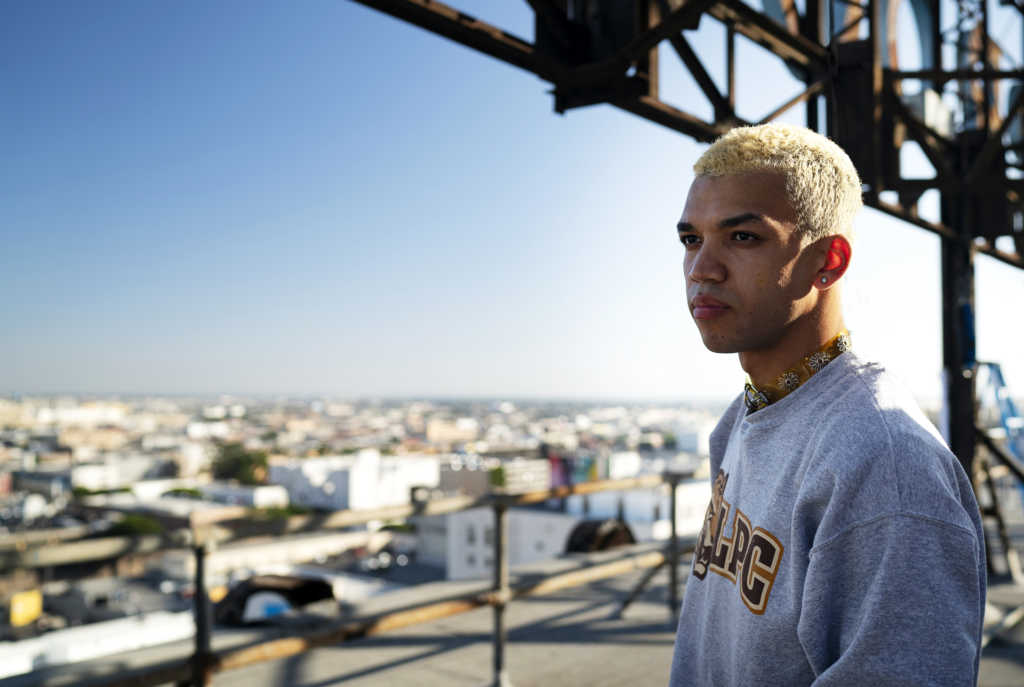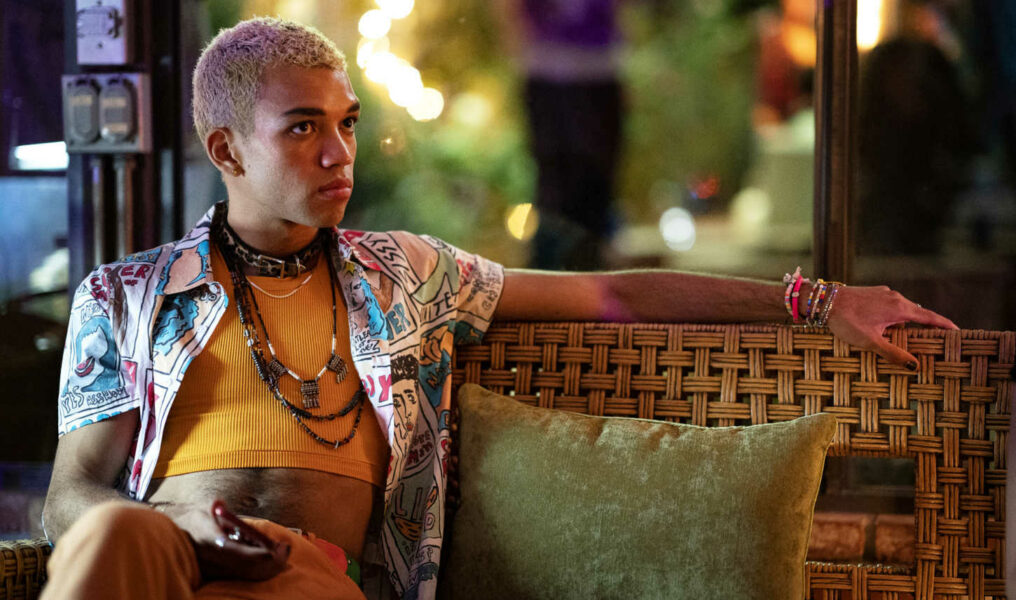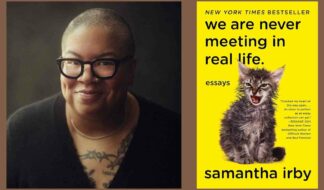Last summer, Justice Smith wasn't coming out but, instead, making a statement in solidarity with the Black trans and queer community. On Instagram, the 25-year-old actor posted a video while attending a protest against white supremacy and police brutality in New Orleans. He acknowledged he's queer, yes. And yes, he revealed he was partnered, with then-boyfriend and "Queen Sugar" star Nicholas Ashe (the two have since broken up, Smith told us).
Still, he didn't intend for the post to be about his own identity, exactly. It was more about visibility: "If your revolution does not include Black Queer voices, it is anti-Black," he wrote. "If your revolution is OK with letting Black trans people like #TonyMcDade slip through the cracks in order to solely liberate Black cishet men, it is anti-Black."
Nearly a year later, the "Jurassic World: Fallen Kingdom" and "Pokémon Detective Pikachu" actor is using the power of representation to continue these conversations with his role on HBO Max's supremely gay series "Genera+ion." On the show, he portrays Chester, a defiantly gay Gen Z'er who struts his high school halls in nipple-exposing crop tops — dress code be damned. In many ways, the series' commitment to LGBTQ+ storytelling is next-level teen queerness. Writing for MEL magazine, Joseph Longo described it as "post-'It Gets Better' TV," noting that, when it comes to queer representation on TV, "It's good we're finally seeing our messes splayed on screen, not excused."
Recently, Smith spoke about how Chester has emboldened him to embrace his femininity, being a role model for young Black queer boys to channel their Black joy, and going from being "so noticeably un-hot" to a half-naked heartthrob.
I think the most obvious question to start with is: How many mesh shirts has Chester inspired you to buy?
(Laughs.) Um, so far zero, but I definitely am looking at the racks and being like, god, I really wish I had the confidence to get that crop top or to get that yada-yada-yada. I will say that there's been a few hoodies in my closet that I am like, "This doesn't need the bottom half of it," and I just cut it into a crop. It's liberating wearing clothes like that, you know?

Has Chester been influential in not just your style evolution but how you look at your own sexuality?
Chester has really done a lot for my own sense of feminine power. I think that everybody contains masculine and feminine qualities. And I think as a man, you're taught to repress or hide your femininity, and I've realized by playing Chester, who is somebody who rejects labels in general and expresses himself through all means of the gender spectrum, he's given me a sense of my own feminine power. Something that I've kind of ignored because of how I have internalized the messages that I have received from society.
You've played a lot of quiet introverts, until Chester, of course. What was it like to step into someone who's unapologetically himself and also unabashedly loud about who he is?
I feel like I have that quality in my personal life; authenticity is really important to me, and I am someone who, at least within my close-knit group of friends, is bold and loud and not afraid to ask for what I want. But for some reason I was getting cast (as) a lot of these characters who were meek and insecure and quiet, which, you know, I also have those sides.
I still do consider myself an introvert. But I knew that it was time to show the world that I have all of these different sides of me, and that's what I set out to do: being an actor I set out to kind of express the multitude of my being, and I think Chester was the perfect person to show that side of me, of this, like, boldness. It's also being in that 24/7. Like, every day I go to set being in that confidence and boldness, it's cathartic, it's inspirational. It just juices up that self-confidence that I felt like I already had but definitely ignored.
I love hearing that. A little different than running away from Tyrannosaurus Rex.
A little different, but marginally. (Laughs.)
Running away from toxic masculinity and the patriarchy.
(Laughs.) Yeah, exactly. They are essentially the same thing.
I have been loving how much attention you've been getting for this role. How do you process comments on Twitter, or beyond Twitter, that are like, "I want Justice Smith" or "I can no longer ignore how hot I find Justice Smith." There was another one that said, "Justice Smith, having a hot boyfriend. Mmmm, I wanna make it a throuple."
Oh, no. Oh, wow. I don't … I don't even … I didn't even know that that was a thing (laughs). I'm, like, blushing. It's so funny because you spend most of your life being so noticeably un-hot and unattractive (laughs), and you're like, "I better develop a personality, because I don't really got anything else going for me." And then, I guess, as you get older, something clicks. I also do feel like a little bit is the way you hold yourself. Confident people just kind of are more attractive, so I think when they see me being confident on the show, they're like, "Oh, he's hot," but I'm like, "Nah." (Laughs.) In real life, no, 'cause that's like an energy thing that I'm doing.
There's something to be said about who you are on the show, you know, baring your midriff in almost every scene. I guess that's not you in real life, is what you're saying.
No, no, no, no. But this show has made me, at first, very insecure, but now very secure in my body, because it's like I have to work out all the time because Chester's an athlete, and I am nothing of the sort. But also, I remember when we first started out, I wore that crop top and I was just like, "Don't you fucking breathe, tense all your muscles, act like you're, like, chilled but actually, inside, you're freaking the fuck out." And now I tell our costume designer, Shirley Kurata, "This needs to be sluttier; we need to show more skin." (Laughs.)
In the pilot, I was not breathing. When I do that strip-tease thing, I didn't breathe for one second. I was like, "Suck in, tense all of your abs." (Laughs.) It was intense. I was so nervous. But now it's like, "I am so used to being naked on set." Because I do it all the time.
While spending your teen years in Orange County, were you surrounded by as many queer people as Chester is in "Genera+ion"?
Yeah, because I went to an art school in Orange County, I got — maybe that's a stereotype that, you know, "artists are just queer, they are fluid." That's why I love artists. There's a lot of artists that are not queer, but sometimes young queer people are drawn to art schools.
Like at my high school, all the popular kids were queer kids and it was predominantly female, and there were a lot of straight people too, but it just was not uncommon for people to embrace who they were. It was a little bit of a bubble, which I am grateful for in some ways, because it shielded me from the way the world thought about queerness, and when I got out into the real world, I was like, "Oh shit, that's not good." But I had a lot of strength from being surrounded by queerness all (during) my upbringing.

Do you have a specific idea in mind of what you hope to accomplish in an industry that has been predominantly white and straight?
I was just talking to my little brother about this today: I find that the most radical protest is unapologetic self-love and self-acceptance, and that there is so much leading I can do by example, by putting my face on screen so that young Black and biracial boys can see themselves represented. It's unfortunately radical, but also, it shouldn't be a radical thing, just my existence, but it is. And the fact that I can utilize it and be like, "Well, then I am going to represent myself, and people who look like me and people who love like me, and make them feel less alone." That I realize is my greatest power in all of this.
I am just doing what I love; acting is what I love to do, it is what I've always set out to do, and I just happen to exist in a Black queer body. And while I am very invested in social issues, it's unfair that as a Black queer person I am almost forced to speak out about social issues, when people of the majority are not necessarily inclined to do so or obligated to do so. I hope that paradigm shifts, in that white, straight, cis people are obligated to talk about social issues just as often as BIPOC or queer people have to when they exist in the public zeitgeist.
But until that happens, I'm so cool with just being like, "This is my face, this is who I love." Like, "Kids, see yourself in me. I am here; you can do this too."
I know that a part of that is you putting your relationship out there. I mean, that is also making a statement saying, "Well, queer love is love." I wonder how conscious you are of making that kind of statement by making your relationship public, but also: Do you draw a line somewhere?
It's interesting, because I have thought about this. That relationship was incredibly expansive to me. We're no longer together, but it really opened me up as a person. I don't wanna go into it too much, which is ironic 'cause that is exactly what we are talking about — how much I revealed about my relationship — but I think, moreover, there's so much Black boy, Black queer joy in my life, and there is so much Black pain in the zeitgeist, and I want to make sure that people know that I am aligned with this pain, and I am feeling this pain intimately, because I am a part of this community. But moreover, I want people to see the example of Black queer joy.
I was just talking to my little brother about this too: When you surround yourself (with) images of pain and tragedy and solitude constantly, or you internalize those messages that society gives you, it starts to manifest in your life. The minute you start to surround yourself with just images of joy, specifically of people of your community experiencing joy, it also shapes your brain, and it's like, "Oh, no, no, no, no; there is happiness for me out there. There is love out there for me, there is success out there for me, because I can see it. I see someone like me doing it." And so that was really important to me to just be like, I have all this Black boy joy, all this Black love, this Black queer love, and I want people to see it, so that other Black queers are like, "No, in all this pain there is light. There is love. There is happiness. There is joy."
But I do want to say, to answer your question, which I didn't (laughs), is that I am really private about my relationships. But I think that was more of a statement to my community, just to remind them of the good in all of this.
Your single "Bed" just came out. Can you tell me a bit about the song and how it came about? Also, are we going to get a full album at some point?
Yeah, the song I wrote about three or four years ago, about a relationship I was in, and I was really just in love with this person. I realized how much a relationship exists in the framing of a bedroom. Not just in a sexual way, but how the bedroom is a place where you share intimacy, where you share conciliation, where you can be lazy with one another, where you can laugh with one another, you can sit around watching TV. You can argue, you can cry. It's the most private, pure form of a relationship when you are with your partner in bed.
And an album — yes! I would love to make an album. I have all these songs written. So I am just so honored that we get to share (this) with the world now, because it's something I never thought I would really do. But here I am.
You're going to have a lot of moments in your career when you are going to say that to yourself.
Yeah, that's true. That's very true. But that's always where the most growth happens: when you do the things that you thought you would never do.
This interview has been lightly edited and condensed for clarity.











